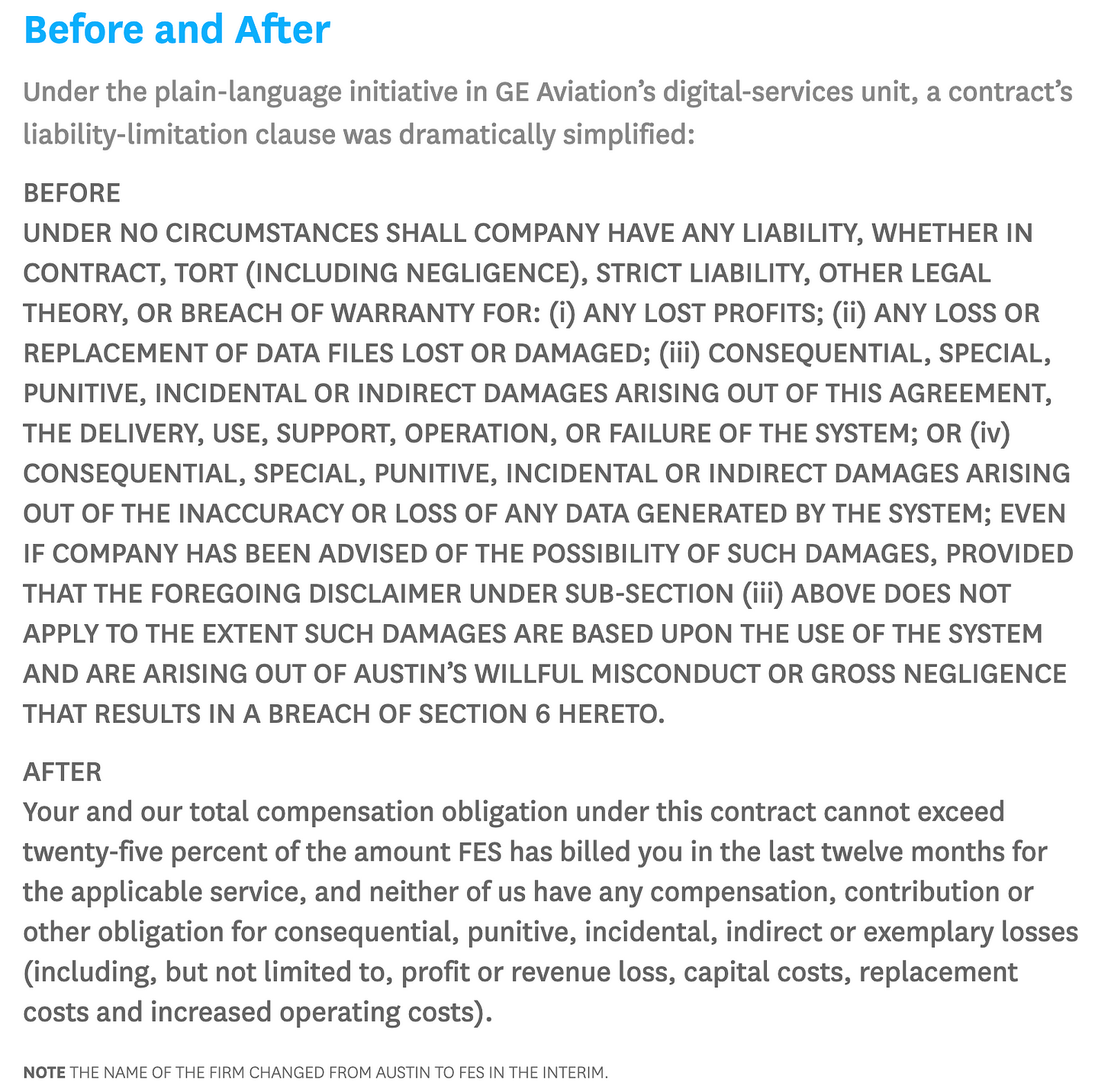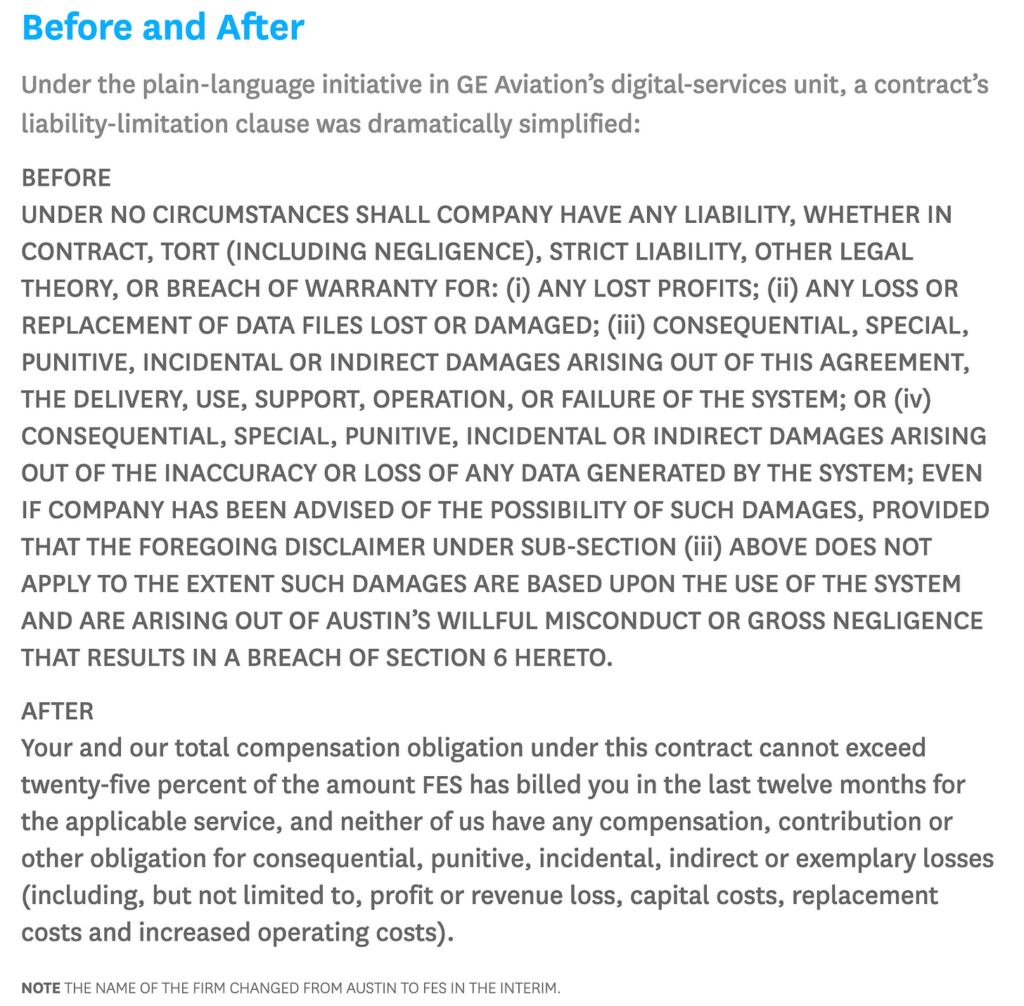Because we are not omniscient creatures, we have to feel our way through life in the dark. One way to bring light to our surroundings is through language. Unfortunately, language is complex. On top of that, our limited nature is really good at overcomplicating things, and language is one of the things we overcomplicate.
However, if we would simplify our language, our businesses would be more profitable. Shawn Burton, the general counsel for GE’s Aviation division, made a compelling case that clear language leads to clear performance in the Harvard Business Review.
We’ve all read all-caps legalese filled with “heretofore” and “forthwith,” and you and I both scroll right on through. Ain’t nobody gonna read that. Burton figured as much, and so he set out to clarify his division’s contracts with plain language guidelines. Yes, there are guidelines for such a thing. There’s even a department in the US government devoted to them.
Burton and his team went to work converting his division’s contracts so that a high schooler could understand them: “The liability-limitation clause shrank from more than 140 all-capitalized words to just 66 words of regular text.” This is the before and after of their work.
The effort was a huge success. The new contracts increased their speed to close sales, clients were happier, and the other divisions wanted in: “Plain-language contracting is beginning to spread inside GE. GE Healthcare has launched a plain-language initiative. GE’s additive-manufacturing business implemented its first plain-language contract in 2017; the initial customer response has been positive, and the unit’s general counsel and business leaders are committed to making plain language the standard approach.”
However, GE and legalese aren’t the only abusers of language. A columnist at the Financial Times rattles off other CEOs who fill their communiqués with jargon and management speak. The worst of all, to her, is Howard Schultz of Starbucks, with phrases like “delivering an immersive, ultra-premium, coffee-forward experience.” See also recent Economist columns on the wooliest words and the wasted years.
Language like this is rampant even for great communicators. Clients want to “drive user adoption,” which means they want people to use their website. They have a big ask instead of a big request, a lot of learns instead of lessons, deliverables instead of products, or actionable steps instead of, well, just steps. One even said to me they want results that are more actualizable. Even our acronyms can be confusing: COB (close of business), EOD (end of day), FWIW (for what it’s worth), IMO (in my opinion), and so on. I use these frequently, but they can also become very unclear very quickly, slowing down everyone. It wouldn’t hurt to just spell out the phrase—a few more seconds on your end could save minutes on someone else’s.
The greatest essay on language like this and its inevitable errors is George Orwell’s “Politics and the English Language.” I do highly recommend reading it sometime. There are a lot of learns in this little essay, and it completely changed my life.
One of its passages highlights biblical language, how simple, accessible, and enduring it is. He uses Ecclesiastes as an example, and then translates it into “modern English.” Here’s the passage:
I returned and saw under the sun, that the race is not to the swift, nor the battle to the strong, neither yet bread to the wise, nor yet riches to men of understanding, nor yet favor to men of skill; but time and chance happen to them all.
Here it is in modern English:
Objective considerations of contemporary phenomena compel the conclusion that success or failure in competitive activities exhibits no tendency to be commensurate with innate capacity, but that a considerable element of the unpredictable must invariably be taken into account.
As Orwell says, “This is a parody, but not a very gross one.” Writing like this floods my inbox and my textbooks. This is the writing of academics as well as managers, pedants, and peons alike.
I hope today that in your emails with colleagues, you strive for clarity and simplicity. In doing so you’re contributing to not only the profitability of the company but also to your readers’ sanity.





